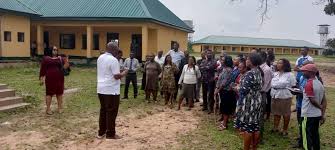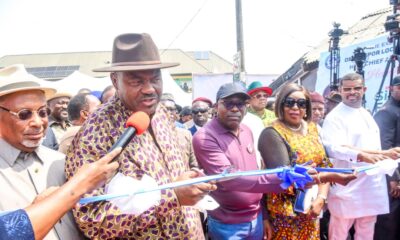Education
Nigeria’s Spending On Education Above 26% UNESCO’s Recommendation -FG
The Federal Government has admitted that the education sector in the country is facing enormous challenges but insisted that the quantum spending on education in Nigeria is far above the stated 26 per cent recommended budgetary allocation to the sector.
This came as the United Nations (UN), has tasked Nigeria to ensure that educational institutions are made safe and affordable for children in the country.
Minister of State for Education, Goodluck Opiah, Permanent Secretary, Federal Ministry of Education, Andrew David Adejo and Mamadou Lamine Sow, Senior Education Advisor, united Nations Educational Scientific and Cultural Organisation (UNESCO), spoke on Thursday in Abuja at Transforming Education Summit: Second National Consultation organised by National Universities Commission (NUC) in partnership with UNICEF and UNESCO.
Opiah in his brief remark at the event, which is a pre-UN Summit, acknowledged that the challenges facing the education sector in the country were enormous, requiring all hands to be on deck to address.
He commended the contributions of the global stakeholders, especially, the World Bank, and United Nations agencies including the United Nations Children’s Fund (UNICEF) and UNESCO among others, to the development of the education sector in Nigeria, adding that the summit was the right step in the right direction.
Following disruptions in the education sector by the COVID-19 pandemic, the United Nations Secretary-General is convening a Transforming Education Summit (TES) in September 2022, aimed at mobilising action, ambition, solidarity, and solutions to transform education between now and 2030.
The Permanent Secretary, Adejo in his presentation entitled “Transforming Education in Nigeria: TES and beyond, said the neglect of the sector over time led to the unimaginable crisis being witnessed currently.
He disclosed that the quantum spending on the education sector in Nigeria, was far above the recommended 26 per cent by UNESCO, for countries to allocate between 15 to 26 per cent of their national budget to education.
Adejo argued that education is on the concurrent list with responsibility for basic education largely in the hands of State Governments, while the Federal Government provides intervention through Universal Basic Education Commission (UBEC), Tertiary Education Trust Fund (TETFund) among others, saying the spending by States and intervention at the Federal level are not reflected in the national budget.
He, however, noted that public financing was no longer sustainable, urging the private sector to continue to invest in education in Nigeria.
On the transformation of the teaching profession, Adejo disclosed that President MuhammaduBuhari had already approved robust incentives for teachers and students studying education in universities and colleges of education in Nigeria.
He particularly revealed that the Federal Government is doing all it could to ensure that scholarship awards to students studying education courses in tertiary Institutions come into effect in 2023.
He noted that there was the need to ensure full recovery from COVID-19 education disruptions, address educational exclusion, safety and health, renew curricula and pedagogies while also steering the digital transformation for just and equitable learning.
Senior Education Advisor, UNESCO Abuja Regional Office, MamadouLamine Sow, on his part, urged the Federal Government to ensure that children in Nigeria are safe on their way to and from school and while they are at school.
Sow said: “Our collective commitment and action are urgently needed to wipe out the scourge of school attacks inNigeria.
“We must make education affordable for all learners – the poor, vulnerable, excluded, and marginalized children, through the removal of both direct, indirect and opportunity costs of education.
“Nigeria must mobilise and significantly increase the part of domestic resources allocated to education and ensure that funds are used efficiently and effectively to support the disadvantaged children, to develop and maintain school infrastructures, and to support the quality of teaching and learning for better learning outcomes.
Deputy Executive Secretary of the National Universities Commission (NUC), Mr Chris Maiyaki, said the inclusive national consultation, in advance of the September 2022 Transforming Education Summit, is necessary to develop national statements to feed into the Summit.
He also tasked stakeholders to take advantage of the opportunity to renew commitment to the Education 2030 agenda by mobilising cross-sectoral stakeholders in support of education.
Education
Oyo Subeb Recruits More Teachers For Primary, Junior Secondary Schools

The Oyo State Universal Basic Education Board has released the names of 5,600 newly recruited primary school teachers and 80 caregivers in the State.
The SUBEB Chairman, Nureni Adeniran, who announced this in Ibadan, the state capital, on Friday, explained that the list had been duly approved by the state Governor, Seyi Makinde.
“The newly appointed teachers and caregivers are the first batch of successful applicants from the recent recruitment exercise carried out by the board,” he said.
“The list will be uploaded on the portal and will be available for candidates to check their names from the portal.
Education
Corruption In Governance: Don Advocates Traditional Values Promotion

A Professor of Accountancy in the Department of Accounting , Faculty of Administration and Management, Rivers State University, Prof Lawyer Chukwumah Obara has advocated the adoption of African traditional values as a managerial tool to eradicate systemic corruption and mismanagement of public funds in governance.
According to him , the use of such African traditional methods like shrine oath-taking by public servants will deter such public officials from misappropriation of public funds while in office. He said accounting system is evolutionary science that recognises the practice of some pragmatic ideological practices such as African norms and values to fight corruption and mismanagement of funds that is predominantly noticed in both public and private governance.
Prof Obara stated this while delivering his inaugural lecture at the 106th inaugural lecture series of the state university with the topic, “Pragmatic Ideologies and Visionary Accounting: Reinforcing the Helmet, “ held at the Senate auditorium,last Wednesday.
He noted that all the 36 States including the Federal Capital Territory in the country can convinently survive without any federal allocation if they embrace pragmatic ideological accounting systems that are visionary accounting methods.
“Every State must adopt pragmatic approaches in their accounting system,there should be accountability and transparency, ,we must be flexible in our Constitution as constitutional rigidity is bane of the growth of the nation and we must go back to our root , traditional values and that will promote wonderful accounting system and the world will celebrate us,”he stated.
The erudite scholar noted that Accounting science helmet provides a safety umbrella to shade RAIR from shady accounting practices and can serve as both protective measure and forward looking.
Mr Vice Chancellor,in the foregoing senses, reinforcement can increase the probability that the accounting’ behaviour will occur again in similar situations.This implies that reinforcing the helmet is a powerful tool in shaping accountants behaviour, learning and development and this can lead to more effective strategies in accounting therapy and everyday interactions”,he stated.
The lecture examined the evolution of philosophical thought in accounting, notion of pragmatic ideologies in accounting, visionary accounting paradigm , transparency , differences and similarities,the helmet metaphor : balancing protection progress.
He posisted that accounting plays vital role in the socio-economic development of nations , stressing that Accounting is the instrument for financial management , transparency, and resource allocation.
“Over the years ,the accounting system has undergone significant transformations influenced by historical developments , regulatory reforms, and the adoption of global standards which serve as the helmet reinforcing and protecting socio_economic development.”
Reinforcement is a fundamental concept in behavioral psychology and learning theory, particularly in the context of operant conditioning. it refers to any stimulus or event that increases the likelihood of a behaviour being repeated in the future.It can be understood as a mechanism that encourages certain behaviors through rewards or consequences,”he stated.
In concluding, Prof Obara stated that Nigeria’s economic landscape demands an accounting profession that is both pragmatic and visionary .
Earlier in his speech,the Vice Chancellor of the university Prof Nlerum Sunday Okogbule represented by the Deputy Vice Chancellor, Administration, Prof Victor Akujuru the lecture said is valuable and is capable to advancing the growth and development of any society if adopted, even as he commended the lecturer for a thoughtful and impacted inaugural lecture.
By: Akujobi Amadi
Education
RSUBEB Officials Visit Riverine Schools In Abua /Odual

A team of board members and directors of the Rivers State Universal Basic Education Board led by Member in charge of Supervision / Monitoring, Chief Nwuke Anucha visited Ogboloma,a riverine community in Abua/Odual Local Government Area of the State to inspect a six classroom block built single handedly by the community recently.
Speaking at the King’s palace shortly after inspecting the building and facilities in the school, Chief Anucha, who represented the board chairman, Alabo David Briggs, commended the people of Ogboloma for remaining united and working in synergy for the good of the community and the younger generation.
While assuring them that the board chairman would surely be briefed on the effort so far made by the community in encouraging education in the area, Anucha expressed optimism that he (Briggs) will not hesitate to give his approval for the school to kick off and called on the people to see education as the responsibility of all.
He used the medium to thank the King of Ogboloma His Highness Micah Brother, the councilor, Hon. Thomas Carlson; CDC Chairman, Lucky Brave Egba, Chiefs and elders and youths for working in synergy for the progress of community.
Also speaking, the board member in charge of projects Dr. Walson Ominini lauded the people for promoting education in the area, assuring them that their effort will not be in vain.
Earlier in his speech, the King of Ogboloma, His King Micah Brother thanked the bfor finding time to visit the community, pointing out that the six classroom block was the singular effort of the community and appealed to the board chairman to give approval for the school to kick off.
The King who spoke through the councillor representing the area, Hon. Thomas Carlson narrated how children in the community are trekking long distances to neighbouring communities in search of quality education and sometimes would be bitten by snakes called on the board to come to their aid as government presence is not in any way felt in the community.
The chiefs also spoke, thanking the board officers for coming to see things for themselves.
By: Akujobi Amadi
-
Rivers5 days ago
PH/Owerri Road Users Express Relief Over Killing Of Kidnap Kingpin
-

 Featured5 days ago
Featured5 days agoFG urges unified efforts against emerging COVID-19 threats
-

 Business4 days ago
Business4 days agoNigeria’ll Lead In Agricultural Export This Year – Tinubu
-

 News5 days ago
News5 days agoYou’ve Shown Courage In Defence Of Rivers, Fubara Tells Sen Mbata …As He Marks 65th Birthday
-
News4 days ago
Work on Eleme Road delaying fuel distribution from PH Refinery – PETROAN
-
Rivers5 days ago
Commissioner Commends Gov Over Support For Ministry
-
Rivers5 days ago
Rivers CP decorates 118 Newly promoted officers of the police Command.
-
Women4 days ago
Dealing With Issues Of Singlehood

